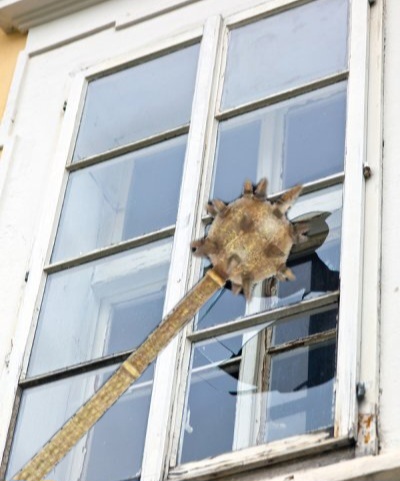That’s actually a pretty nifty idea. Too bad we live in a privacy nightmare and can’t trust others.
Perhaps this would be a good use for other connected devices like smart power meters.
It’s a private feature in the Weather app on iPhone.
To understand and improve the Weather app, Apple collects limited information about the first time you launch the app in a day. This information is not linked to your identity. If you allow Weather to access your location, your location will be sent to Apple to provide relevant weather forecasts.
You understand the photo is not from the default iPhone weather app, but from a completely separate app and service with a separate privacy policy “The weather channel”, right?
I do. That’s why I specified that same feature is private in the Weather app.
There’s no mention of barometer/fitness permission on Apple’s page, just location?
This is actually a really great feature. Dark Sky first started using crowdsourced barometric pressure readings to provide rain warnings. It provided a 10-minute warning for rain that was incredibly accurate. Living in NY, I got a 10-minute notification because someone 10-minutes southwest of me just got rained on.
Apple bought Dark Sky a couple years ago, and integrated the feature into the Weather app. The data is anonymized (hashed, encrypted, and relayed), so now it’s completely private.
It uses more power by leaving location services and barometric readings on persistently, but you can turn it on and off when you need it. It’s great for cyclists, runners, and hikers.
Technically, wouldn’t you need the guy 10 minutes in the direction of the rain cloud to have turned it on when you go on a hike? Makes the battery saving argument kinda moot I guess, you should get the notification anyway, if enough people in your area are providing sufficient data for the short term forecast.
Now in order to make that happen, people should participate if they’re using the feature, but that’s almost a moral argument I guess.
Anyway, would still be nice if iOS / Android had more fine grained permission controls.
That’s true. It works well when I use it. I guess it’s supplementing with the data it gets from the NWS.
I’m sure most people turn it off if they notice the location indicator in the corner is persistent, or when iOS notifies them that an app is using their location in the background for an extended period.
iOS has fine permission controls. Each API needs to be user authenticated before becoming available to any app, first or third-party. You can enable or revoke any API permission in settings under privacy.
Maybe they only turn the warnings on if you’re sharing. If you have the barometer off, then they could tell you there’s rain coming, but tough nuts
It’s a good idea. The watch I wear mountaineering is loaded with sensors, including a barometer. If my altitude hasn’t changed much, it alerts me of big pressure drops which means a storm is on the way. This is excellent when your side of the mountain is sunny and you can’t see or feel the wind from the massive system rolling in from the other side.
Great for camping in valleys too.
Why don’t you just feel the pressure drop in your bones? That’s what I do and I’m not even old.
Why is the barometer on the phone handled by the fitness shit? If this is legit the reason it wants health and fitness permissions, the sensors should just have their own permission category, IMO. Or you know, just have everything piecemeal so the app only uses what it actually needs and gets nothing more.
The barometer is one sensor in a package of sensors that includes the health and fitness-oriented sensors. The permission grants access to the sensor package.
I understand that; I just question why. What’s the barometer used for in the context of health and fitness? Blood pressure?
It uses the barometer to detect elevation changes. Like walking up stairs indoors without GPS signal.
It isn’t related. The manufacturer of the sensor package realized they could put a barometer in the package at a smaller cost than what they could charge for having added it, so they did. There’s no conspiracy except for the usual profit hunting.
I appreciate the rain in 10min. notifications, but there is no way I’d give an app access my sensors just for this, especially an app that is fully or partially ad subsidized. Is there a way to verify that it only accesses this one sensor?
Phones come with barometers now?
If you have an android, check the Fdroid store, there are several apps that show you the raw output from every type of sensor on your device. I was surprised to find out several features on mine.
At least since iPhone 6ish? I think Dark Sky was one of the first apps to use it effectively. They’d aggregate the atmospheric data across it’s users to make hyper local weather predictions (i.e. “rain in 10 minutes”)
7. It was their reasoning behind removal of a headphone jack
I know when I’m looking for a new phone I pay special attention to make sure it has a state of the art barometer
Yep, mostly just used to help crowdsource weather reporting like this.
Though I have seen another interesting use-case for the barometer, which is for IP-rated (water-resistant) phones, you can use the barometer to check that your device still has a water-tight seal with an app that measures the pressure as you squeeze the sides of the phone together.
I thought barometers were initially included to help with location. Air pressure isn’t just for weather, it also helps work out your altitude.
iPhone has had a barometer since 2014.
I’m glad I wasn’t the only one thinking this
They need to know your height so they can tell you how the weather is up there
deleted by creator
Years ago when I had a jailbroken iPhone and a firewall app, I had downloaded and tried the Accuweather app. That fucking app contacted TWENTY-SIX third-party servers to upload data. Like a few moments into setting it up and running it, the harvesting hath begun. I was like - fuck that, and deleted the app. I haven’t even considered using it ever since. This was like mid-2000s.
Owned by IBM.










